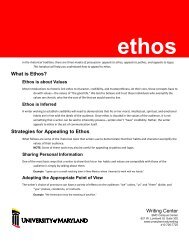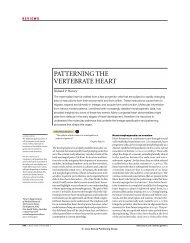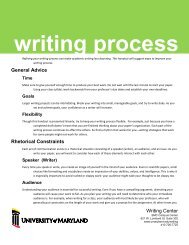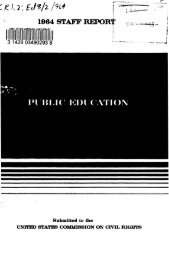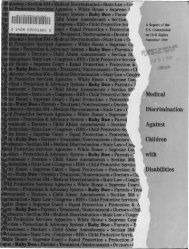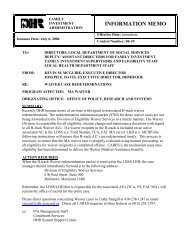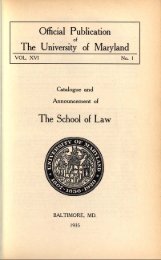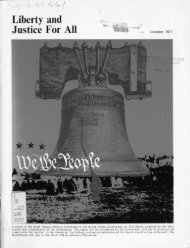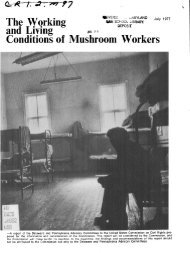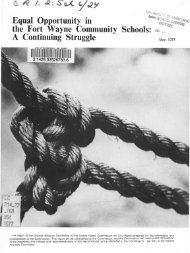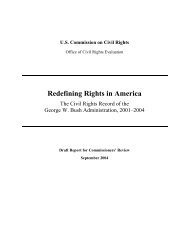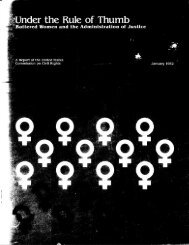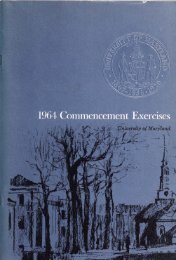Field Manual for 2013-2014 - University of Maryland School of ...
Field Manual for 2013-2014 - University of Maryland School of ...
Field Manual for 2013-2014 - University of Maryland School of ...
You also want an ePaper? Increase the reach of your titles
YUMPU automatically turns print PDFs into web optimized ePapers that Google loves.
69<br />
• monitoring and evaluation<br />
3. Demonstrate the ability to establish effective and collaborative working relationships with people <strong>of</strong><br />
various cultural backgrounds and identities, especially with at-risk populations.<br />
4. Be able to advocate in political arenas through the development <strong>of</strong> political actions strategies based<br />
on policy analyses on local, state and/or national arenas.<br />
5. Demonstrate the ability to interview people, listen to and learn from individuals and groups from<br />
diverse economic, political, social and cultural backgrounds.<br />
6. Organize and staff effective task groups (standing committees, boards, adhoc committees, councils,<br />
action groups, etc.).<br />
7. Obtain administrative skills in organizing duties and activities, setting priorities, working under<br />
pressure, preparing clearly written records, reports and memos in a timely manner.<br />
8. Apply principles <strong>of</strong> research and evaluation to the practice setting.<br />
9. Create and/or manage an in<strong>for</strong>mation technology system <strong>for</strong> an organization or community.<br />
10. Develop self-awareness and constructive use <strong>of</strong> that self-awareness in practice and supervision;<br />
self-identify learning needs and communicate them to the <strong>Field</strong> Instructor.<br />
C. Attitude Objectives<br />
1. Demonstrate a commitment to social justice and to social work values reflected in the NASW Code <strong>of</strong><br />
Ethics.<br />
2. Show appreciation <strong>for</strong> the rich and positive contributions to community life brought by people <strong>of</strong><br />
diverse backgrounds, socio-economic levels and cultural groups; and sensitivity to the systemic barriers<br />
faced by these persons that are derived from inequitable policies and practices.<br />
3. Commit to clients and consumers as equal partners in social change endeavors.<br />
4. Understand the constructive use <strong>of</strong> conflict to promote social justice and community change, and<br />
productively manage conflict when it arises in community and administrative practice.<br />
5. Recognize and adhere to pr<strong>of</strong>essional boundaries with clients, constituents, and co-workers.<br />
Learning Contract<br />
All students, in collaboration with their <strong>Field</strong> Instructors and Faculty Liasons, must develop a learning contract<br />
in which they indicate how they will successfully demonstrate the MACRO knowledge, skills and attitude<br />
learning objectives. All MACRO students need to integrate these learning objectives and demonstrate<br />
competence in the following areas:<br />
• Policy analysis and development in the public, community or organizational arena;<br />
• Community assessment and intervention;<br />
• Organizational assessment and intervention;<br />
• Application <strong>of</strong> principles <strong>of</strong> multicultural practice;<br />
• Self awareness, development and pr<strong>of</strong>essional learning within the context <strong>of</strong> the NASW Code <strong>of</strong><br />
Ethics.<br />
It is primarily the responsibility <strong>of</strong> the student, in consultation with the <strong>Field</strong> Instructor and Faculty Liason,<br />
to be sure that learning assignments are undertaken that will demonstrate one’s abilities in these areas. The<br />
learning contract becomes the basis upon which the student is evaluated. Problems with designing and/or<br />
completing the learning contract need to be collaboratively addressed by the student, Instructor and Liaison.<br />
A learning contract template is available on the <strong>Field</strong> web site. The contract covers the key learning areas,<br />
activities to be undertaken to fulfill that learning area, expected outcomes, anticipated completion date, and<br />
whether or not the assignment was successfully completed. A copy <strong>of</strong> the learning contract, and any revisions,<br />
must be included with the end <strong>of</strong> semester evaluations.



